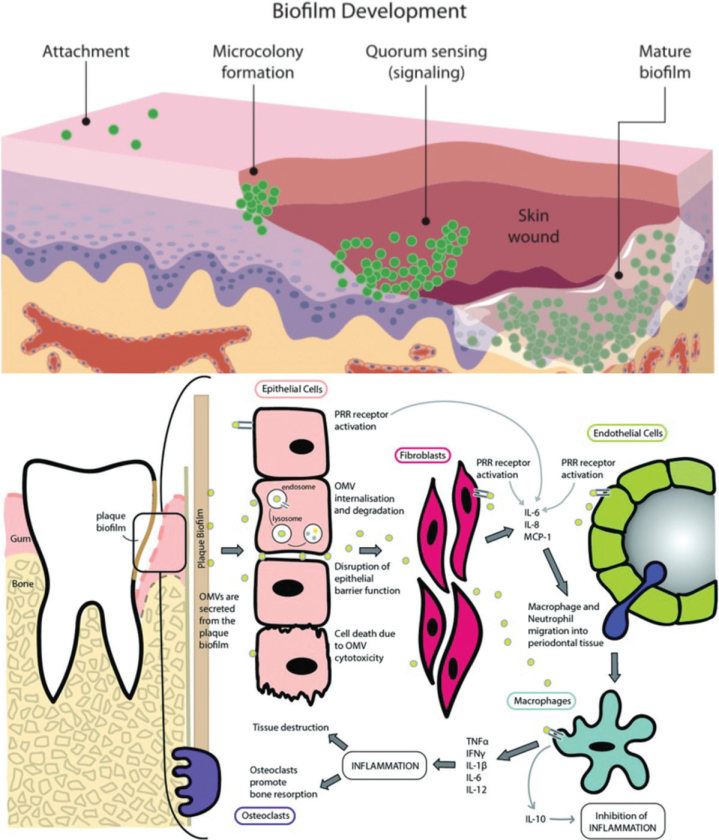Porphyromonas gingivalis-derived Exosome Research and Application
Porphyromonas gingivalis is a key pathogenic bacterium for chronic periodontal disease. It affects the physiological and pathological processes of the host by releasing exosomes (also known as outer membrane vesicles). Numerous studies have found that Porphyromonas gingivalis-derived exosomes contain various bioactive molecules, which may be involved in the onset and progression of multiple diseases, such as neuroinflammation, Alzheimer's disease, arthritis, and periodontal disease. Creative Biolabs pays special attention to the mechanisms and functions of Porphyromonas gingivalis-derived exosomes, providing new research insights for clients.
Contents of Porphyromonas gingivalis-derived Exosomes
Porphyromonas gingivalis-derived exosomes contain various bioactive molecules:
-
Lipopolysaccharide: A key factor in triggering host immune responses, leading to inflammation and immune activation.
-
Proteases: These enzymes can degrade host tissues, causing inflammation and damage.
-
Nucleic acids: These nucleic acids may be involved in host-pathogen interactions, affecting cellular functions.
-
Adhesins: Adhesins on the exosome surface help in interacting with host cells, potentially leading to intracellular biological effects.
-
Other bioactive molecules.
Role of Porphyromonas gingivalis-derived Exosomes in Periodontal Disease
Porphyromonas gingivalis-derived exosomes play a significant role in periodontal disease. Studies show that exosomes are key mediators for Porphyromonas gingivalis to influence oral and overall health in various ways. This is because these exosomes can carry multiple pathogenic factors, such as proteases, lipopolysaccharides, and nucleic acids, triggering host inflammatory responses. This leads to inflammation and damage to oral tissues and is one of the key factors in the development of periodontal disease. Furthermore, exosomes assist in the distant spread of Porphyromonas gingivalis. They can enter distant organs and tissues via the bloodstream, lymphatic system, or across barriers, affecting host cell functions, such as damaging the blood-brain barrier, disrupting neuron functions, and inducing cell apoptosis. Therefore, the role of Porphyromonas gingivalis-derived exosomes in periodontal disease involves multiple aspects, including oral inflammation, systemic spread, and impaired host cell functions, all contributing to the progression of periodontal disease and potential systemic health issues.
 Fig.1 Production and regulation of Porphyromonas gingivalis outer membrane vesicles.1,2
Fig.1 Production and regulation of Porphyromonas gingivalis outer membrane vesicles.1,2
Role of Porphyromonas gingivalis-derived Exosomes in Neurodegenerative Diseases
Porphyromonas gingivalis-derived exosomes have been linked to the development of neurodegenerative diseases, especially Alzheimer's disease. Studies indicate that these exosomes can cross the blood-brain barrier, enter the brain, and trigger inflammatory responses. Additionally, these exosomes might lead to the phosphorylation of Tau protein, a characteristic of Alzheimer's disease. These findings suggest that Porphyromonas gingivalis-derived exosomes might be a part of the pathogenic mechanism of Alzheimer's disease, offering new directions for the treatment and prevention of the disease.
Role of Porphyromonas gingivalis-derived Exosomes in Metabolic Diseases
There is a close connection between metabolic diseases like diabetes and arthritis and chronic periodontal disease. Studies have found that Porphyromonas gingivalis-derived exosomes can exacerbate these diseases by affecting host cell metabolism. These exosomes may influence metabolic diseases by altering cellular glucose metabolism pathways, promoting chronic inflammation, and activating inflammatory signaling pathways. This process might involve various bioactive molecules in the exosomes, including lipopolysaccharides, proteases, and nucleic acids. Studies suggest that Porphyromonas gingivalis-derived exosomes might lead to insulin resistance, glucose metabolism abnormalities, and arthritis, further exacerbating the progression of metabolic diseases.
Connection between Porphyromonas gingivalis-derived Exosomes, Oral Health, and Pregnancy Complications
Pregnancy complications like gestational hypertension and fetal growth restriction pose serious threats to maternal and fetal health. Recent research suggests that chronic periodontal disease might be associated with these complications, and Porphyromonas gingivalis-derived exosomes might be a key factor. Laboratory studies have found that these exosomes can affect the metabolism of trophoblast cells, resulting in impaired trophoblast and placental function. Additionally, these exosomes might induce pregnancy complications by inhibiting glucose metabolism pathways, reducing cell migration and invasion capabilities, and affecting placental nutrient supply. 3
Based on these scientific findings, we see immense potential and hope in the application of Porphyromonas gingivalis-derived exosomes. In the future, Creative Biolabs is eager to invest more resources and efforts with clients to further explore the functions and applications of exosomes, providing new insights and methods for disease diagnosis and treatment. If you have any needs regarding exosomes derived from microbes, please feel free to contact us.
Bacteria-derived Exosome Isolation and Identification
In Vitro Functional Discovery of Bacteria-derived Exosomes
In Vivo Functional Discovery of Bacteria-derived Exosomes
References
-
Zhang, Z.; et al. The role of Porphyromonas gingivalis outer membrane vesicles in periodontal disease and related systemic diseases. Frontiers In Cellular and Infection Microbiology. 2020, 10:585917.
-
under Open Access license CC BY 4.0, without modification.
For Research Use Only. Cannot be used by patients.
Related Services:

 Fig.1 Production and regulation of Porphyromonas gingivalis outer membrane vesicles.1,2
Fig.1 Production and regulation of Porphyromonas gingivalis outer membrane vesicles.1,2








